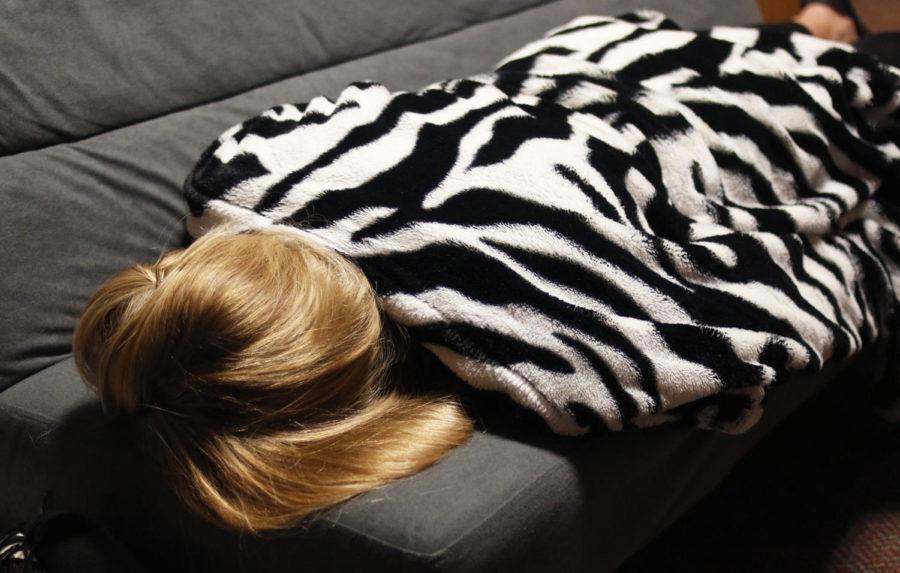Wandschneider: Importance of sleep
Hayley Hochstetler/Iowa State Daily
Sleep is a very essential part of everyone’s life and not getting enough is not healthy. Not only will it leave you feeling groggy, but lack of sleep can actually lead to serious illness. Unfortunately, you can never actually catch up on missed sleep, so get as much as you can when you can.
November 19, 2013
With Thanksgiving Break approaching in a few days, excitement is brimming among Iowa State’s students. It isn’t because there will be no classes for a week or that we will be able to catch up with our family and friends. For many, it is because we are given one glorious week to do the one thing that all college students lack: sleep.
Between homework, jobs and various campus activities, getting the recommended eight hours is nearly impossible. Getting even a measly six hours a night is considered lucky. To cope with the lack of sleep, students turn to caffeine. As I write this column I am currently running on about six and a half hours of sleep and sipping on a turtle mocha, double shot, from Bookends. It isn’t that I don’t want to sleep, I just don’t have the time. With that temporary boost of energy, the lack of sleep doesn’t seem like a terrible thing.
We are all guilty of overlooking the value of sleep, but we don’t understand what we are truly missing.
As young adults, we need between seven and a half to nine hours of sleep each night. The more work we have to do and energy we need to burn the next day, the more sleep we must get the night before.
This amount is difficult to attain as a college student. There is homework that needs to get done and having some type of social life is healthy. With so much to do in the day, I often place sleep on the backburner.
We all know that sleep is an important function, but do we really know what we are getting out of sleep?
Sleep is the time for our body and mind to recuperate after a strenuous day. It is your body’s only chance to complete important functions that can’t be done during the day. During this time, your body is repairing your muscles, finalizing memories and releasing proper amounts of hormones that regulate hunger and growth. If you don’t get the correct amount of sleep, these functions haven’t been completed. As a result, it is difficult to get through the next day.
The longer that one goes without the proper amount of sleep, the more sleep deprived one will get. By being sleep deprived, it is much more difficult to perform everyday activities. The smallest things instigate sleepy feelings. Warm lecture halls suddenly make it impossible to keep our eyes open.
The more sleep-debt we acquire, the harder it is to perform simple functions. To try and regain some energy to make it through the day, sugar and caffeine are a quick fix.
For a moment it seems like everything is back to normal. Instead of feeling tired, jittery feelings make it difficult to sit still. Bedtime is the last thing on the mind, with all of this energy surging through your veins, who needs sleep?
The problem with this is that that feeling is only short-lived. Not too long after the effects kick in, sleepiness overcomes the body. As a result, more caffeine and sugar is consumed. Not only is this preventing you from being able to go to sleep, it is also allowing you to consume many unneeded calories.
This is why sleep deprived people are more prone to gain weight. Between the excessive amount of sugar and the lack of hormones to regulate hunger, some extra poundage isn’t a surprise.
Another consequence is that our immune system becomes much weaker due to an inadequate amount of sleep. This leaves college students more prone to illnesses that would have normally been easily fought off. This is one of the few times that we are able to finally get the sleep we deserved. Waiting until we are ill should not be the reason to start paying attention to how many hours we are getting per night.
A common solution to keep all of this from happening and still continuing with poor sleeping habits is catching up on sleep during the weekends. Actually this is a myth, as one can never actually catch up on missed sleep. Getting extra sleep on the weekends does help, but the amount lost can never fully be regained.
So when there is an option to sleep or do something else, choose sleep. Those eight hours do more good than what one may think.

















